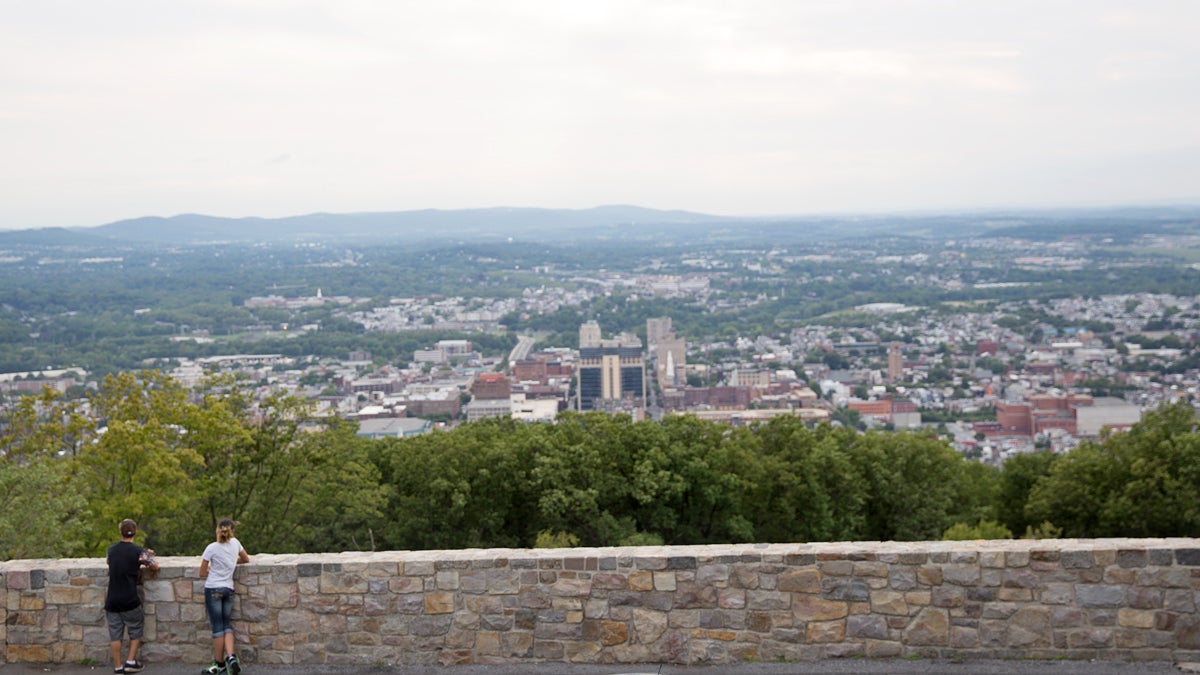ReDesign Reading’s Brian Kelly on the costs of competition and financial illiteracy in a city with low self-esteem

Two teenagers take in the view of Reading, Pa. from Mount Penn near the Pagoda. (Lindsay Lazarski/WHYY)
Brian Kelly is the executive director of ReDesign Reading. The city created the CDC last year with an ecologically-minded, inclusive bent.
“Five Questions with …” is a regular Keystone Crossroads feature where we seek to glean wisdom and ideas from some of Pennsylvania’s top urban thinkers and doers. Brian Kelly is the executive director of ReDesign Reading. The city created the community development corporation last year with an ecologically-minded, inclusive bent.
Q: Tell us about an amenity or service that you’ve seen in your travels to other places that you wish you could bring back to Reading.
A: The Champlain Housing Land Trust is an amazing resource in Vermont that helps preserve affordability both home ownership and rental markets. The organization offers unique lease-to-own options that help individuals who aren’t actually ready for home ownership to build equity, combining a wealth building strategy with financial literacy. I have met families in Reading who have been renting in the same house for over five years. An innovatively-structured land trust model could cater to the population of long-term renters who are not interested in home ownership per se, but would significantly benefit from developing equity.
Q: What’s one urban improvement idea that you could categorize as “nice try but didn’t work”?
A: Promoting free market competition in residential trash collection. Due to a misguided cultural belief that competition always reduces costs and increases efficiency, Reading residents may choose from any number of private trash haulers to remove their waste. The pay-as-you-throw operations exist alongside a citywide trash collection program. This creates a huge operating inefficiency for the city, since many households opt out of the program and pay private haulers per bag instead. This encourages illegal dumping of waste by households attempting to avoid paying for trash collection altogether, further increasing the costs to the city.
Q: Describe a person in your community who is a “spark” someone — who seems to get things done and inspire people.
A: Johanny Cepeda is an amazing asset to Reading. Johanny is a connector…she brings together people with energy to help ideas move forward. She has developed her restaurant, Mi Casa Su Casa, into a central hub for community life. She showcases local artists, brings together community residents to discuss important issues affecting the community, and ignites a passion in everyone she interacts with to do more for our city. She lives and breathes Reading and community initiatives, and has a demonstrable impact on the lives of many in the city.
Q: What flaw or habit does Reading have that you would like to see it change?
A: The City of Reading suffers from low self-esteem. The biggest critics of the area are locals who generalize that although things may be bad elsewhere, they are worse in Reading because of…the people here..they union here…the newspaper here…the crime here…you name it, it is way worse in Reading. As someone who has lived in a number of cities in my life, Reading has an amazing collection of safe, walkable streets, abundant outdoor recreation opportunities and bike trails, and a large number of people who are interested in making a positive impact in their community. I would like to see people shifting their mindset away from hopelessness and towards the recognition of possibility.
Q: Tell us about a movie or book that depicts, in a way that grabbed your attention, how a city can thrive or fail.
A: Two books really grabbed my attention about the possibilities of what’s necessary to lay the foundation of a new economy. Going local: Creating Self-reliant Communities in a Global Age, by Michael Shuman, deals with the nuts and bolts at the local level, diving into the types of initiatives that are possible to develop local economic resilience. Although slightly dated at this point, Capitalism 3.0, by Peter Barnes, takes a much broader approach, outlining the concept of the commons and its critical role in a 21st century economy. Barnes outlines one of the critical conceptual struggles of the coming decades, where democracy, economic opportunity, and ecological justice concerns collide in our social system.
Is there someone you know who thinks hard about cities and knows how to get things done? Someone whom Keystone Crossroads should spend “Five Questions with …” Please let us know in the comment sections below or via Facebook or Twitter @Pacrossroads.
WHYY is your source for fact-based, in-depth journalism and information. As a nonprofit organization, we rely on financial support from readers like you. Please give today.



